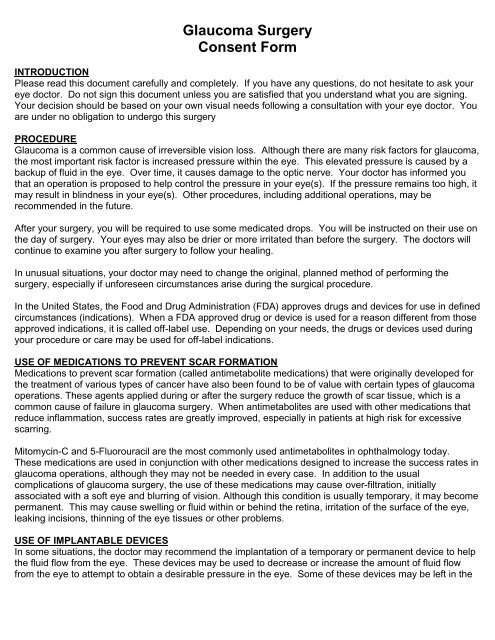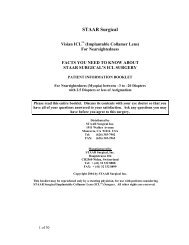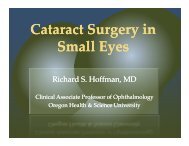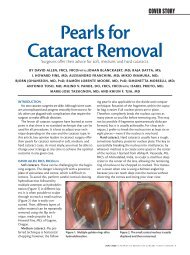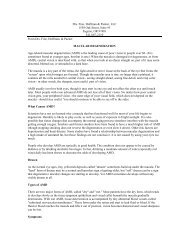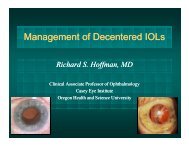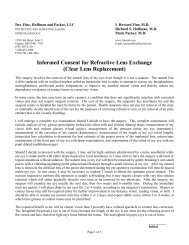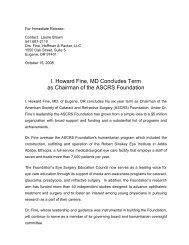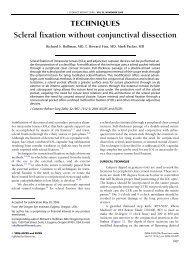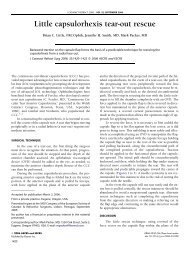Glaucoma Surgery Consent Form
Glaucoma Surgery Consent Form
Glaucoma Surgery Consent Form
Create successful ePaper yourself
Turn your PDF publications into a flip-book with our unique Google optimized e-Paper software.
<strong>Glaucoma</strong> <strong>Surgery</strong><br />
<strong>Consent</strong> <strong>Form</strong><br />
INTRODUCTION<br />
Please read this document carefully and completely. If you have any questions, do not hesitate to ask your<br />
eye doctor. Do not sign this document unless you are satisfied that you understand what you are signing.<br />
Your decision should be based on your own visual needs following a consultation with your eye doctor. You<br />
are under no obligation to undergo this surgery<br />
PROCEDURE<br />
<strong>Glaucoma</strong> is a common cause of irreversible vision loss. Although there are many risk factors for glaucoma,<br />
the most important risk factor is increased pressure within the eye. This elevated pressure is caused by a<br />
backup of fluid in the eye. Over time, it causes damage to the optic nerve. Your doctor has informed you<br />
that an operation is proposed to help control the pressure in your eye(s). If the pressure remains too high, it<br />
may result in blindness in your eye(s). Other procedures, including additional operations, may be<br />
recommended in the future.<br />
After your surgery, you will be required to use some medicated drops. You will be instructed on their use on<br />
the day of surgery. Your eyes may also be drier or more irritated than before the surgery. The doctors will<br />
continue to examine you after surgery to follow your healing.<br />
In unusual situations, your doctor may need to change the original, planned method of performing the<br />
surgery, especially if unforeseen circumstances arise during the surgical procedure.<br />
In the United States, the Food and Drug Administration (FDA) approves drugs and devices for use in defined<br />
circumstances (indications). When a FDA approved drug or device is used for a reason different from those<br />
approved indications, it is called off-label use. Depending on your needs, the drugs or devices used during<br />
your procedure or care may be used for off-label indications.<br />
USE OF MEDICATIONS TO PREVENT SCAR FORMATION<br />
Medications to prevent scar formation (called antimetabolite medications) that were originally developed for<br />
the treatment of various types of cancer have also been found to be of value with certain types of glaucoma<br />
operations. These agents applied during or after the surgery reduce the growth of scar tissue, which is a<br />
common cause of failure in glaucoma surgery. When antimetabolites are used with other medications that<br />
reduce inflammation, success rates are greatly improved, especially in patients at high risk for excessive<br />
scarring.<br />
Mitomycin-C and 5-Fluorouracil are the most commonly used antimetabolites in ophthalmology today.<br />
These medications are used in conjunction with other medications designed to increase the success rates in<br />
glaucoma operations, although they may not be needed in every case. In addition to the usual<br />
complications of glaucoma surgery, the use of these medications may cause over-filtration, initially<br />
associated with a soft eye and blurring of vision. Although this condition is usually temporary, it may become<br />
permanent. This may cause swelling or fluid within or behind the retina, irritation of the surface of the eye,<br />
leaking incisions, thinning of the eye tissues or other problems.<br />
USE OF IMPLANTABLE DEVICES<br />
In some situations, the doctor may recommend the implantation of a temporary or permanent device to help<br />
the fluid flow from the eye. These devices may be used to decrease or increase the amount of fluid flow<br />
from the eye to attempt to obtain a desirable pressure in the eye. Some of these devices may be left in the
eye permanently or may require further intervention, such as suture removal. There may be complications<br />
associated with these devices such as too much filtration, inadequate filtration, infection or double vision.<br />
RISKS OR DISCOMFORTS<br />
Any surgical procedure carries potential risks. Complications associated with glaucoma surgery may<br />
include: hemorrhage (bleeding) in your eye, infection, closure of the drain, inflammation and retinal or<br />
choroidal detachment. Any of these can result in the loss of sight in the eye. A cataract may develop, and<br />
this may have to be removed at some future date. Sometimes the pressure in the eye becomes too low or<br />
too high and this may necessitate other treatments or operations. You may have to continue treating the<br />
eye with drops, ointments or oral medications, or the doctor may have to give injections of medications<br />
around the eye. Also, the pressure in your other eye may become elevated. If your surgery involves the<br />
creation of a drain in your eye, you may be able to feel the drain or sutures under your eyelid, which may<br />
cause a scratchy sensation. The sensation is generally helped by topical lubricants. Some of the<br />
complications, such as cataract formation, infection, or closure of the drain, may occur years after this<br />
operation.<br />
Complications due to anesthesia are possible, such as drug reactions or other problems. These<br />
complications may involve other parts of your body, including the possibility of brain damage or even death.<br />
Rarely, the optic nerve may be damaged, which can result in loss of sight. Since it is not possible to list<br />
every potential complication that may occur as a result of any surgery, this list is incomplete, and there may<br />
be risks associated with this surgery that are currently unknown.<br />
All patients, even those who have not had eye surgery, should wear safety glasses for situations where they<br />
may get stuck in the eye, but this is especially important if you have had previous eye surgery.<br />
Contact your doctor with any problems noticed after the surgery, such as an increase in pain, light<br />
sensitivity, loss of vision, or unusual mattering or discharge from the operative eye. Many complications are<br />
manageable if caught early. You are responsible for reporting any symptoms and making arrangements to<br />
be evaluated and are also responsible for the associated fees.<br />
BENEFITS<br />
Although the results of your surgery cannot be guaranteed, the expected benefit is improved fluid flow within<br />
the eye, which will help lower the eye pressure and slow or stop glaucoma-related vision loss. Specific<br />
results from this treatment cannot be guaranteed. Eye surgeries typically do not make your vision perfect in<br />
all situations.<br />
ALTERNATIVE TREATMENTS<br />
You may elect not to have this surgery. In this situation, normally your condition will stay the same or<br />
perhaps worsen over time. Non-surgical treatments such as eye drops or pills may be helpful in some<br />
situations. Sometimes a combination of methods may be necessary.<br />
CONSENT TO PERFORM THE SURGICAL PROCEDURE<br />
I have been given an opportunity to ask any questions concerning the surgery. My doctor and his/her staff<br />
have answered my questions. I understand I am able to receive a copy of this consent form. By signing this<br />
document, I am stating I have read this document and had explained to me the possible risks, complications<br />
and benefits associated with the surgery.<br />
I herby willingly give my consent to have Annette Sims, MD perform this surgery performed on:
My Right Eye My Left Eye Both My Eyes<br />
Patient Signature: __________________________ Date: _______________<br />
Printed Name of Patient: _____________________ Time: ___:___ a.m. / p.m. (circle one)<br />
Witness Signature: __________________________ Date: ______________<br />
Printed Name of Witness: _____________________


